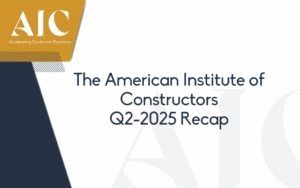A construction dispute is one of the most costly expenses that a construction company or contractor can incur as part of doing business. According to a recent industry study, the cost of a construction dispute in the U.S. is currently $37.9 million, which is double the previously calculated value of $18.8 million.
COVID-19 is an obvious reason for disputes, as the pandemic dramatically altered the nature of construction, just like other industries. However, the larger reason why there has been a dramatic increase in construction disputes is because owners, contractors, and subcontractors are misaligned around the terms of the contract.
The industry study discovered that the primary cause of the dramatic increase in construction disputes is stakeholders “failing to understand and/or comply with their contractual obligations.”
Clearly, there is a need for increased construction leadership ensuring that all parties are on the same page and understand their role in successful project delivery. This is why we believe it is critical that your company offers construction management training to personnel that are responsible for managing the execution of all or a substantial portion of a construction project.
What is the Value of Construction Management Training?
Construction management training provides personnel such as construction managers, project managers, project executives, general superintendents, and operations managers with the advanced skills and knowledge required to support each critical area of a construction project.
There are many unique and complicated facets of managing a construction project to ensure that all parties are upholding the terms of the contract. Without the proper training, it is very easy to misunderstand key aspects of the contract that will lead to disputes, project delays, legal ramifications, and additional costs.
Therefore, it is imperative that professional constructors in your company have a solid understanding of the legal implications and risks associated with specific clauses within the numerous documents contained in a construction contract. Consider three key aspects of searching and interpreting the construction documents:
- A constructor must be able to understand the basic rules for interpreting the contract if a conflict arises between two clauses to determine which clause takes precedence.
- A constructor must be able to determine the ramifications if certain clauses are omitted or not discussed.
- A constructor must be able to determine the amount of risk involved due to certain disclaimer clauses.
In order to interpret the contract, evaluate information, and assess the ramifications and risk involved, it’s critical to have a fundamental understanding of how the contract is crafted between owners, contractors, and subcontractors.
Value the Fundamentals of the Construction Contract
In construction, the primary purpose of an agreement between stakeholders is to facilitate the timely delivery of skilled labor and materials. Each contract agreement outlines how this is to be accomplished.
As you know, the agreement will contain certain terms and conditions or contract clauses that take precedence over all other documents. The agreement will also establish the scope and intent of the parties. Your team of professional constructors must understand certain clauses that are included in the contract, and which clauses take precedence in which situations. Some of the clauses that professional constructors need to be aware of include the following:
- The Whole Contract Clause
- The Intent of the Contract Clause
- Incorporated by Reference Clause
- Contractual Provisions Clause
- Enumeration Clause
Then, in addition to understanding the clauses, professional constructors also need to understand when to adhere to owner-developed general conditions that some owners incorporate into the construction documents.
In these situations, constructors need to be able to interpret the general conditions against the clauses. Constructors need to be able to identify omitted and disclaimer clauses that may shift liability to your company. This way, issues can be proactively addressed before they turn into disputes, ensuring contract alignment between all parties.
Fortunately, you can provide necessary construction management training to your constructors by partnering with our organization, the American Institute of Constructors (AIC).
Access Construction Management Training for Constructors
Because of the highly complex nature of construction, we believe it is imperative to constantly provide your professional constructors with training on key construction topics.
Regardless of an individual’s position or length of service in the industry, individuals involved in construction management can boost job performance, better support contracts, and create additional value for your company through regular training.
That’s why we recommend that your personnel become AIC members to gain access to numerous resources that will have a positive impact on your company’s ability to support a construction contract and avoid disputes:
- Access tools and resources to improve job performance.
- Find relevant information from construction content providers through AIC University.
- Connect with a network of peers facing the same challenges that can offer solutions.
- Tap into a wide range of professional development opportunities to advance skills and knowledge.
Reduce the risk of contract disputes in 2022 and beyond. Encourage your professional constructors to register to become a Professional Member of AIC.
Have questions about AIC membership? Don’t hesitate to contact us today to further discuss.




